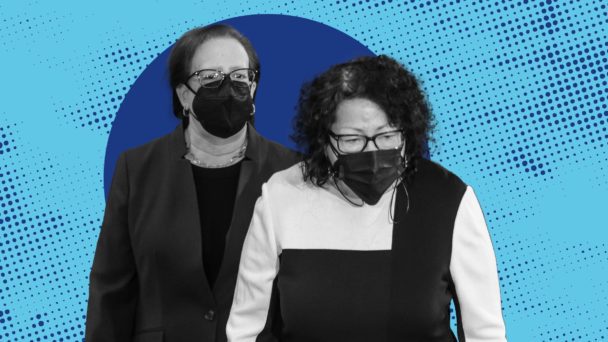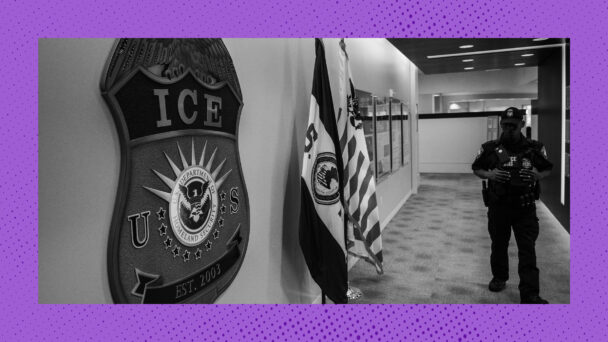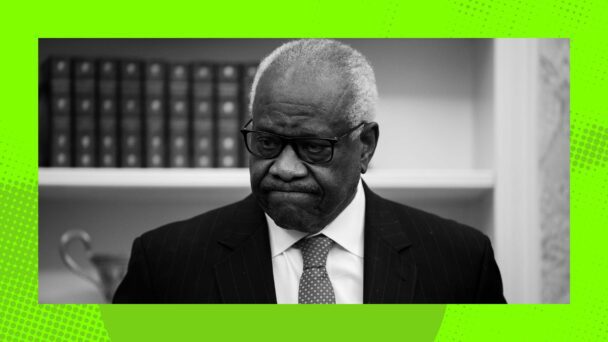Ala’a Hamayel is a Palestinian national who has lived in the United States for nearly twenty years. His wife of over a decade, Amina Bouarfa, is a U.S. citizen, as are their three young children. But Ala’a is not, and so the family lives in a state of perpetual risk: Any day could be the day that a husband and father will be separated from his wife and kids.
Amina tried to fix this. In 2014, she petitioned U.S. Citizenship and Immigration Services to classify her husband as an immediate relative, and make him eligible for lawful permanent resident status. And in 2015, USCIS granted that petition. Then, two years later, the government changed its mind, explaining that it “never should have approved” Amina’s petition in the first place. Why? Federal law prohibits the approval of petitions for people who’d previously been married to evade immigration laws, and the government claimed there was “substantial and probative evidence” that Ala’a’s first marriage, which ended in 2007, was a sham for immigration purposes. This, the government said, was a “non-discretionary” bar to approving Amina’s petition.
Amina, Ala’a, and Ala’a’s first wife all contest that characterization. But the government’s doubts about the legitimacy of that earlier marriage has thrown Ala’a’s very real familial relationships into disarray.
Amina is now fighting to get a court to take a second look. Under federal law, if the government denies your visa petition because you didn’t meet its non-discretionary criteria, you’re entitled to judicial review. But what happened to Ala’a and Amina is slightly different: The government approved their visa petition, and then revoked it because it made a mistake. Put differently, there’s no doubt that Ala’a and Amina would be entitled to judicial review if their petition had been denied the first time. Yet depending on how the Supreme Court decides their case, Bouarfa v. Mayorkas, the government’s bureaucratic mistake could deny Amina and Ala’a the chance to even get into court.
If Ala’a is removed to Palestine, either Amina and the children would also move to an active war zone, or they would live an ocean apart. Yet that danger and injustice seemed lost on basically every Supreme Court justice but Neil Gorsuch during oral argument on Tuesday.
Since Amina could have gone to court if USCIS denied her petition, Chief Justice John Roberts didn’t think keeping her out of court now was a big deal. “Just apply again,” he said, on the assumption that she’ll promptly get denied and will be able to go to court. “What more do you want?” Amina’s attorney, Samir Deger-Sen, made clear that things aren’t so easy. They did apply again—two years ago—and they still haven’t received a decision. Roberts’ blasé attitude ignored the reality that Amina and Ala’a are still stuck in limbo for who-knows-how-many years, not knowing if their family will be separated.
For Justice Samuel Alito, any concern about Amina and Ala’a’s plight took a backseat to his desire for Homeland Security to have unchecked power. People whose immigration petitions are denied because of non-discretionary requirements are entitled to their day in court, sure. But federal law prevents judges from reviewing the Homeland Security Secretary’s discretionary decisions, and the government argues that revocations of approved petitions fit squarely within this discretionary authority. Alito agreed and emphasized the permissiveness of the revocation statute, which says the Secretary “may, at any time, for what he deems to be good and sufficient cause,” revoke an approved petition. “It confers about the broadest measure of discretion that you could imagine,” Alito said. For him, the risk to a real-life family means nothing compared to maximizing Homeland Security’s ability to do what it wants.
Justice Neil Gorsuch’s occasional skepticism of executive power made him basically Amina’s only friend on the bench. Gorsuch asked if courts would still be prevented from reviewing a revocation decision if the government were acting arbitrarily—in Gorsuch’s words, if it were “throwing all the papers up in the air” and saying, “We’re going to revoke the pile that lands over there, despite all of our fine-tuned regulations.” The lawyer from the Solicitor General’s office representing the government, Colleen Sinzdak, responded that Congress “assumes that the agency is not going to behave like a monster” when it enacts barriers to judicial review.
Gorsuch stopped her. “I would have thought,” he said. “But you’re telling me that they can.” As Gorsuch made clear, the government’s theory of the case would allow Homeland Security to behave monstrously and keep courts from doing something about it.
In one striking moment toward the end of oral argument, Sinzdak and Justice Elena Kagan turned to hypotheticals about dessert to tease out whether the judicial review bar would still apply if the Secretary only ever exercised their discretion in one direction, such as always revoking petitions if they suspected a sham marriage. “If I tell my daughter that she has discretionary authority to decide whether to have dessert every night, as a practical matter, she is going to eat dessert every single night,” Sinzdak said, to laughter from the gallery. Sinzdak’s point was that a grant of discretionary authority here means there could be no review of her daughter’s decision, even though the exercise of “discretion” was only ever going to lead to one outcome—here, dessert, and for Amina and Ala’a, removal. Kagan clarified that Sinzdak’s daughter would still be able to say, “I have a policy of having dessert.” Raucous laughter again ensued.
The laughter was jarring considering the threat to Amina and Ala’a’s family. And when Deger-Sen, Amina’s counsel, returned to the podium, he tried to push the Court to get serious. The petition review process takes years. After the government revokes a petition, the petitioner could be booted to the back of the line. At this point, if Ala’a were to ever get citizenship—and that’s a big if—it could require well over another decade of waiting, uncertainty, and fear.
“There are real stakes in this case,” Deger-Sen told the justices. “But there are no stakes on the government’s side.” Without citizenship, Ala’a could be sent back to Palestine, where upwards of 40,000 people have been killed in the war on Gaza. Yet somehow, for the second time in a week, the Court is dealing in glib food-related hypotheticals while the people before them are dealing with tremendous suffering.






